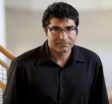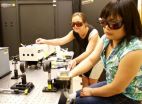(Press-News.org) A new study supports a growing body of research suggesting a safe and effective role for natural steroid hormones in treating postmenopausal breast cancer, with fewer detrimental side effects and improved health profile than with standard anti-hormone therapies. The study will be published in final format today in the open-access journal Reproductive Biology and Endocrinology.
Breast cancer is the most frequently diagnosed cancer in women in the United States. Approximately 70% of breast cancers are diagnosed in postmenopausal women. Major clinical trials and experimental studies showed that a class of anti-estrogen drugs called aromatase inhibitors (AIs) is effective against postmenopausal breast cancer. Yet despite their effectiveness in reducing tumor recurrence, aromatase inhibitors have adverse effects on the cardiovascular system and increase osteoporosis and bone fractures, which may explain their lack of overall survival improvement versus the older treatment, tamoxifen. These effects, together with undesirable side effects such as incontinence and bone and joint pain, cause many women to discontinue using AIs. Alternatives are needed.
In their study, researchers at the Center of Excellence in Cancer Research at the Paul L. Foster School of Medicine, Texas Tech University Health Sciences Center, set out to explore a radical and counterintuitive hypothesis: Could an optimal choice of hormones lead to improved survival factors and quality of life, enough to outweigh any negative effect on tumor recurrence? Radical—because current standard of practice considers hormone treatment of any type absolutely contraindicated following hormone-receptor-positive breast cancer. Counterintuitive— because estrogen-blocking aromatase inhibitors, a nearly opposite treatment, are the current adjuvant treatment for women after hormone-sensitive breast cancer.
Results from this study in a mouse model suggest the answer to their question is "yes,"—well-chosen hormones could improve both survival and quality of life.
"We are at a very preliminary stage. Our study's results are promising, but we need to know much more. This study provides a good direction," said Rajkumar Lakshmanaswamy, PhD, lead investigator for the study and research director of the Center of Excellence in Cancer Research.
The study was funded by Parsemus Foundation, a nonprofit foundation focused on reproductive health.
HORMONES: NOT ALL THE SAME
In the experiments, the researchers used the same type of hormones present in the body, because bioidentical hormones have been shown to possess a more positive risk-benefit profile than molecularly altered hormones. In the landmark Women's Health Initiative study, a negative risk-benefit profile was seen with oral equine estrogens plus oral synthetic medroxyprogesterone acetate (PremPro), an older drug combination that continues to dominate the market in English-speaking countries. Estradiol and progesterone delivered non-orally were selected for the experiments in part because of an extensive literature indicating more favorable outcomes.
The results showed that the right combination of hormone treatments reduced the risk of osteoporosis and cardiovascular disease, undesirable health effects associated with estrogen deficiency following menopause. Adding a little testosterone helped even more. Estrogen, progesterone, and testosterone, together (E plus P plus T treatment) was associated with greater physical activity, improved cognition, and better cardiovascular and bone health in the mouse model, and demonstrated the potential significance of hormone treatment in postmenopausal women.
COUNTERINTUITIVE RESULTS
Giving any sort of estrogen after hormone-sensitive breast cancer would generally be considered "throwing fuel on the fire." But the results were counterintuitive: tumor growth was reduced the most by E plus P plus T treatment. Long term, only in one group—the lowest-dose E plus P group—did addition of hormones result in tumor volumes slightly worse than in the control animals, noted Lakshmanaswamy.
"In this study, the aromatase inhibitor did indeed reduce recurrence as expected. However, recurrence rates in the aromatase inhibitor group bounced back up after the 5-year-equivalent treatment period, and the overall improved health outcomes in the hormone groups meant a trend towards greater survival in those groups. Even more notably, two of the regimens were even better than the aromatase inhibitor at preventing tumor growth," said Arunkumar Arumugam, first author of the study.
To date, epidemiological plus animal and laboratory evidence combined suggest that though the recurrence picture is complicated, the majority of women post-breast-cancer will do better on optimized hormones than on anti-hormones, because of better global outcomes, added Elaine Lissner, executive director of the Parsemus Foundation and second author.
"This study indicated that certain hormone regimens, especially adding testosterone, may even result in lower recurrence rates than aromatase inhibitors, on top of better global health outcomes, survival and quality of life. It's another piece of evidence that hormones don't always work the way we assume," said Lissner.
PART OF A LARGER PUZZLE
V. Craig Jordan, OBE, PhD, DSc, a scientist specializing in medications that treat and prevent breast cancer at the Lombardi Comprehensive Cancer Center, Georgetown University, considers the study an intriguing contribution to a scientific area now receiving a lot of interest. Jordan is widely considered the "father" of tamoxifen, a selective estrogen receptor modulator (SERM) that changed the field of breast cancer treatment. He also proved the anti-cancer effects of raloxifene, another SERM that blocks the effects of estrogen in breast tissue. He now studies how cancer cells can be killed by estrogen after being super-sensitized to it by those very same estrogen-blocking drugs.
The results of this study are consistent with those found in his lab. "This paper has all of the right results for the tumor and the right results for the mouse. It all lines up as far as I'm concerned." The only downside, according to Jordan, is the four-month treatment period for the mice—when women are treated for decades, and tumors are "clever and can change in a heartbeat." "Things happen short term in labs all the time; it's a very hard sell to go from experiments to outside the lab," he said.
The four-month period for mice was designed to be equivalent to five years in a woman's lifespan, and is the same time period used in aromatase inhibitor pre-approval studies. But the trend is towards ever-longer treatment periods with aromatase inhibitors, ten years or more, despite impacts on quality of life.
NEXT STEPS
So should women be asking their doctors for hormone treatment rather than anti-hormone treatment after breast cancer? Could the right hormones be more effective at preventing recurrence than aromatase inhibitors, with better quality of life? For the time being, this will remain radical, says Lissner, and only the most open-minded oncologists will be willing to consider the data—despite epidemiological evidence that women who take hormones after breast cancer have much better survival rates than ones who don't.
The next step, according to Lakshmanaswamy, is to determine the hormone dose that is efficient and provides the maximum benefit with the fewest side effects, if any. But with little profit potential and no pharmaceutical company involvement, those studies are unlikely to get done unless the public pushes for taxpayer-funded research. "Our results show that using natural hormones in appropriate combinations suppresses tumor growth and has beneficial effects on cardiac and bone health, along with better tumor reduction than with current treatments. Many lines of research are coming together now, all pointing in the same direction, but only clinical trials would tell for sure."
INFORMATION:
The final version of the study is accessible online: http://www.rbej.com/content/12/1/66/abstract
About Parsemus Foundation: Parsemus Foundation works to advance innovative and neglected medical research. The foundation supports small proof-of-concept studies and then seeks to raise awareness of results, to ensure that they change treatment practice rather than disappear into the scientific literature. Many of the studies the foundation supports involve low-cost approaches that are not under patent, and thus unlikely to be pursued by pharmaceutical companies due to limited profit potential. More information on Parsemus Foundation and the work presented here can be found at: http://www.parsemusfoundation.org/questioning-aromatase-inhibitors/
Hormones after breast cancer: Not fuel for the fire after all?
Natural hormones reduce breast cancer tumors and have positive effects on cardiac and bone health
2014-07-23
ELSE PRESS RELEASES FROM THIS DATE:
'Big picture' thinking doesn't always lead people to indulge less, study says
2014-07-23
CHAMPAIGN, Ill. — Buy the latest electronic gizmo du jour, or use that money to fix a leaky roof? Go out with friends, or stay home to catch-up on work to meet that looming deadline? And after you've finished that big project, do you treat yourself to a slice of chocolate cake or settle for a piece of fruit?
These are the kind of self-control dilemmas that people face all the time. And according to research from a University of Illinois expert in new product development and marketing, self-focus plays an important role in how consumers make decisions.
When prompted ...
Urban heat boosts some pest populations 200-fold, killing red maples
2014-07-23
New research from North Carolina State University shows that urban "heat islands" are slowly killing red maples in the southeastern United States. One factor is that researchers have found warmer temperatures increase the number of young produced by the gloomy scale insect – a significant tree pest – by 300 percent, which in turn leads to 200 times more adult gloomy scales on urban trees.
"We'd been seeing higher numbers of plant-eating insects like the gloomy scale in cities, and now we know why," says Adam Dale, a Ph.D. student at NC State and lead author of two papers ...
NASA sees Typhoon Matmo making second landfall in China
2014-07-23
NASA's Terra satellite passed over Typhoon Matmo when it was moving through the Taiwan Strait for its final landfall in mainland China.
On July 23 at 02:45 UTC (July 22 at 10:45 p.m. EDT), the Moderate Resolution Imaging Spectroradiometer or MODIS instrument aboard NASA's Terra satellite captured a picture of Typhoon Matmo after its center crossed the northern part of the island nation of Taiwan and entered the Taiwan Strait. The Taiwan Strait is the body of water between western Taiwan and southeastern China. The MODIS image showed a cloud-covered center of circulation, ...
Targeting the brain to treat obesity
2014-07-23
Unlocking the secrets to better treating the pernicious disorders of obesity and dementia reside in the brain, according to a paper from American University's Center for Behavioral Neuroscience. In the paper, researchers make the case for treating obesity with therapies aimed at areas of the brain responsible for memory and learning. Furthermore, treatments that focus on the hippocampus could play a role in reducing certain dementias.
"In the struggle to treat these diseases, therapies and preventive measures often fall short. This is a new way for providers who treat ...
UNC researchers find unsuspected characteristics of new CF drugs, offering potential paths to more effective therapies
2014-07-23
In lab experiments using tissue samples cultured from cystic fibrosis patients, scientists at the UNC School of Medicine and the UNC Marsico Lung Institute have shown that a new CF drug counteracts the intended beneficial molecular effect of another CF drug.
The finding, published today in the journal Science Translational Medicine, shows how a mutant CFTR protein becomes unstable and loses its ability to function properly when in the presence of the two drugs. The research offers several insights into how novel CF pharmacotherapies could be improved.
“In our human ...
Spinach could lead to alternative energy more powerful than Popeye
2014-07-23
WEST LAFAYETTE, Ind. — Spinach gave Popeye super strength, but it also holds the promise of a different power for a group of scientists: the ability to convert sunlight into a clean, efficient alternative fuel.
Purdue University physicists are part of an international group using spinach to study the proteins involved in photosynthesis, the process by which plants convert the sun's energy into carbohydrates used to power cellular processes.
"The proteins we study are part of the most efficient system ever built, capable of converting the energy from the sun into chemical ...
The birth of topological spintronics
2014-07-23
The discovery of a new material combination that could lead to a more efficient approach to computer memory and logic will be described in the journal Nature on July 24, 2014. The research, led by Penn State University and Cornell University physicists, studies "spin torque" in devices that combine a standard magnetic material with a novel material known as a "topological insulator." The team's results show that such a scheme can be 10 times more efficient for controlling magnetic memory or logic than any other combination of materials measured to date.
"This is a really ...
Strategy proposed for preventing diseases of aging
2014-07-23
AUDIO:
Some researchers are proposing that changing how medical care is delivered could help prevent multiple chronic diseases and extend healthy lifespan. The idea, they argue, would be to target the...
Click here for more information.
Medicine focuses almost entirely on fighting chronic diseases in a piecemeal fashion as symptoms develop. Instead, more efforts should be directed to promoting interventions that have the potential to prevent multiple chronic diseases and extend ...
Sleep deprivation may increase susceptibility to false memories
2014-07-23
Not getting enough sleep may increase the likelihood of forming false memories, according to research published in Psychological Science, a journal of the Association for Psychological Science.
In a study conducted by psychological scientist Steven J. Frenda of the University of California, Irvine and colleagues, sleep-deprived people who viewed photographs of a crime being committed and then read false information about the photos were more likely to report remembering the false details in the photos than were those who got a full night's sleep.
Research has demonstrated ...
Satellite shows Atlantic Tropical Depression degenerate
2014-07-23
NOAA's GOES-East satellite captured imagery of the Atlantic Ocean's Tropical Depression 2 is it degenerated into a tropical wave on July 23.
At 1445 UTC (10:45 a.m. EDT), NOAA's GOES-East satellite captured an image of what was once Tropical Depression 2 (TD2), about 400 miles east of the Lesser Antilles. The GOES-East visible satellite imagery indicated that the depression weakened since July 22. TD2 appeared as just a weak swirl of clouds with no strong thunderstorms or deep convection. The GOES image was created by NASA/NOAA's GOES Project at NASA's Goddard Space Flight ...
LAST 30 PRESS RELEASES:
New Inflammatory Bowel Disease testing protocol could speed up diagnosis
Most massive stellar black hole in our galaxy found
New review offers first recommendations on accurately assessing the carbon footprint of coffee farming
Seed ferns: Plants experimented with complex leaf vein networks 201 million years ago
New statewide research reveals the staggering economic cost of intimate partner violence in Louisiana
From ashes to adversity: Lessons from South Australia's business recovery amidst bushfires and pandemic
Multiple pollutants from crop and livestock production in the Yangtze River: status and challenges
Unraveling the unique role of DELLA proteins in grapevine flowering: A shift in developmental fate
Next-generation treatments hitch a ride into cancer cells
Unraveling the role of DlBGAL9 and AGL61/80 in Longan somatic embryogenesis and heat stress tolerance: A multi-omics approach
Decoding pecan pollination: A dive into the chloroplast genome of 'Xinxuan-4' and its impact on cultivar diversity and efficiency
KD-crowd: A knowledge distillation framework for learning from crowds
Can animals count?
Australian media need generative AI policies to help navigate misinformation and disinformation
Illuminating the path to hearing recovery
Unlocking the secrets of fruit quality: How anthocyanins and acidity shape consumer preferences and market value
Evidence for reversible oxygen ion movement during electrical pulsing: enabler of the emerging ferroelectricity in binary oxides
Revolutionizing Citrus cultivation: The superior tolerance and growth vigor of 'Shuzhen No.1' rootstock
Family and media pressure to lose weight in adolescence linked to how people value themselves almost two decades later
Despite the desire to reduce the risk of imitation, new research suggests startups should scale slowly and steadily
The Lancet: Many people with breast cancer ‘systematically left behind’ due to inaction on inequities and hidden suffering
From opioid overdose to treatment initiation: outcomes associated with peer support in emergency departments
NIH awards $3.4 million to Wayne State University to investigate biomarkers for better reproductive success
New study shows corporate misconduct at home hurts sales overseas
Take it from the rats: A junk food diet can cause long-term damage to adolescent brains
Fralin Biomedical Research Institute team unpacking genetic mysteries of childhood epilepsies
UNC-Chapel Hill researchers discover new clues to how tardigrades can survive intense radiation
UT Arlington prioritizes entrepreneurship efforts
Ochsner Health receives 2024 Top Workplaces Culture Excellence Awards
Are these newly found rare cells a missing link in color perception?
[Press-News.org] Hormones after breast cancer: Not fuel for the fire after all?Natural hormones reduce breast cancer tumors and have positive effects on cardiac and bone health






